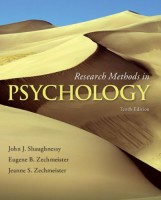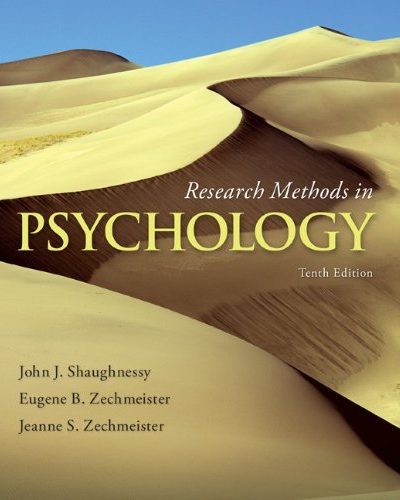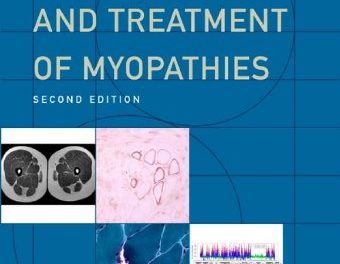 Authors: John J. Shaughnessy PhD, Eugene B. Zechmeister PhD, Jeanne S. Zechmeister PhD
Authors: John J. Shaughnessy PhD, Eugene B. Zechmeister PhD, Jeanne S. Zechmeister PhD
Publisher: McGraw-Hill – 489 pages
Book Review by: Sonu Chandiram
To this 10th edition of Research Methods in Psychology, the authors have added several new features. And they have updated it with newly-discovered data. But essentially their basic purpose remains the same: to introduce students to the research process in psychology and to help them become familiar with, and competently use the various research methods.
Here are the key features of this new edition:
- Focus on the increasing interest in cross-cultural studies
- New material on web usage for survey researchers and for researching online behavior itself
- Thoroughly updated content, including dozens of recently published findings reflecting new trends and techniques
- An emphasis on ethical concerns in the research community
- Many new challenge questions updating research examples and relating to the findings discussed in each chapter
The authors start out after the Introduction by giving readers an overview of the scientific method (which we all learned in our first science class) particularly as it relates to psychology. They then discuss the ethical issues in psychological research. They then go on to discuss descriptive methods and experimental methods in obtaining and analyzing data.
The authors then move on to applied research, discussing single-case research designs, and designs that are not quite experimental in nature. Finally, a long section on analysis and reporting of research concludes the discussion part of the book. An Appendix with statistical tables, a Glossary, a list of References, Credits, a Name Index, and a Subject Index follow at the end of the book.
The chapters present material in a well-organized fashion making it easy to study and absorb facts and points. You will find a Chapter Outline in the beginning, discussions under topics, boxes with interesting titles (e.g. Box 2.1 in chapter 2 entitled: We’re not as smart (or good as we think that lists five books published since 2010)
Other study aids are charts, photos, and tables providing illustration and data supporting the points made in the text.
Each chapter ends with a Summary, Key Concepts, Review Questions, Challenge Questions, Answer to Stretching Exercise, and Answer to Challenge Question 1.
Here is a brief overview of the contents of this book that has five Parts, although you will find a detailed five-page Contents section that you can use to read up in depth on any topic of interest to you.
- General Issues
- Introduction
- The Scientific Method
- Ethical Issues
- Descriptive Methods
- Observation
- Survey Research
- Experimental Methods
- Independent Groups Designs
- Repeated Measures Designs
- Complex Designs
- Applied Research
- Single-Case Research Designs
- Quasi-Experimental Designs and Program Evaluation
- Analyzing and Reporting Research
- Data Analysis and Interpretation: Part I. Describing Data, Confidence Intervals, Correlation
- Data Analysis and Interpretation: Part II. Tests of Statistical Significance and the Analysis Story
- Communication in Psychology
This is an outstanding book on the subject of psychological research. It makes it easy for students to learn the process of research in psychology and to reinforce that learning through repeated use of the various research methods introduced and utilized in it.
John J. Shaughnessy, PhD is Professor of Psychology at Hope College, a relatively small, select, undergraduate liberal arts college in Holland, Michigan. After completing B.S. degree at Loyola University of Chicago in 1969, he received a PhD in 1972 from Northwestern University. He is a Fellow of the Association for Psychological Science and the Midwestern Psychological Association. His recent research has focused on practical aspects of memory. He is coauthor, with Benton J. Underwood, of Experimentation in Psychology (Wiley, 1975). Students selected him as the Hope Outstanding Professor Educator in 1992 and he received the Janet L. Anderson Excellence in Teaching Award from the college in 2008.
Eugene B. Zechmeister, PhD is Professor Emeritus of Psychology at Loyola University of Chicago, a large metropolitan university where he taught both undergraduate and graduate courses since 1970. Professor Zechmeister completed his B.A. degree in 1966 at the University of New Mexico. He later received both and M.S. (1968) and PhD (1970) from Northwestern University. A specialist in the field of human cognition and experimental methodology, Professor Zechmeister has coauthored books on critical thinking, human memory, research methods and statistics. He has been a Fellow both of the American Psychological Association (Divisions 1, 2, and 3) and the Association for Psychological Science. In 1994 he was awarded the Loyola University Sujack Award for Teaching Excellence in the College of Arts and Sciences.
Jeanne Zechmeister, PhD was a member of the Psychology faculty at Loyola University of Chicago from 1990 to 2002. Professor Zechmeister completed her B.A. at University of Wisconsin-Madison (1983) and her M.S. (1988) and PhD (1990) in Clinical Psychology at Northwestern University. She taught undergraduate and graduate courses in research methodology, and her research focused on psychological processes associated with forgiveness. Her effectiveness as a teacher is evidenced by her many years of high teacher ratings and by her being identified consistently each year by graduating seniors as one of the best teachers at Loyola. Dr. Zechmeister now writes in Charlottesville, Virginia.







